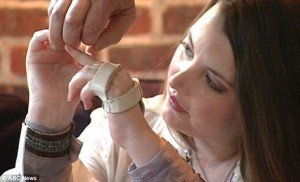Commentary gathered by our colleagues at the UK SMC on the first hand transplant completed in the UK. Meanwhile, US media outlets are carrying the story of quadruple amputee Lindsay Ess, who is learning to use her hands again after having a double hand transplant.
Prof Anthony Warrens, British Society for Immunology member and V-P of the British Transplantation Society, said:

“This is a great achievement technically for the team involved and reflects an extremely well coordinated multidisciplinary approach including surgeons, physicians, psychologists and basic scientists, such as immunologists. It is the sharing of expertise in this way that ultimately works for the benefit of the patient. There are enormous challenges, including the prevention of rejection and the psychological response to a transplanted hand. But with meticulous planning and ongoing multidisciplinary support, this sort of procedure can offer enormous benefits to a selected group of patients. As with all transplantation of this nature, it is important to note the great altruism of the donor and his or her family in agreeing to donate after death and to recognise how much good for others can be done by this phenomenal act of human generosity.”
Professor Norman Williams, President of the Royal College of Surgeons, said:
“This is yet another example of life-changing surgical advancements that are now possible. New surgical techniques together with a greater understanding of organ rejection are making an ever wider range of transplants possible. This presents opportunities for treating conditions and improving quality of life in ways that simply were not possible in the past.
As with all procedures that improve the quality of life rather than save it, there is an ethical balance to be struck – especially as the lifelong anti-rejection medication that the patient would need to take carries its own risks. Care always needs to be taken in choosing suitable patients who understand the risks and benefits. This selection should be by a multi-disciplinary team of doctors which includes a psychologist or psychiatrist as a core-member of the selection team.”
Dr Daniel Sokol, Medical Ethicist and Barrister, and former member of the Royal College of Surgeons Working Party on Laryngeal Transplantation, said:
“A hand transplant, like other major transplants, is a risky and delicate procedure, with huge potential benefits as well as considerable risks. Unlike some forms of transplant, it is not a life-saving procedure so there must be a careful assessment of risks and benefits and patient consent is paramount. The transplant itself is a great achievement, but it is not the end of the road. How the patient will react post-transplant, physically and psychologically, is key to the success of the procedure.”
Lord Robert Winston, Imperial College London, said:
“History repeats itself. The first hand transplant that I was involved with was done by Willy Boeckx and myself in 1975 in Leuven when I was working there (not 1998) when we were pioneering microsurgery. Even then, I am not sure whether it was the first, probably not. What is clear is that since that time there have been a number of hand transplants (I followed one in my TV series Superhuman in 1999 – 2000) which showed that, even when nerves and vessels and tendons were all carefully joined up under a microscope, these transplanted hands were very limited and most often caused huge inconvenience to the recipient because of lack of function – essentially a largely ‘dead hand’ at the end of an arm. I really can’t see this is much of a breakthrough given that a donor hand has extra inconvenience and complications – not least of which is the serious risk of rejection in spite of the need to take powerful and risky immunosuppressive drugs.”